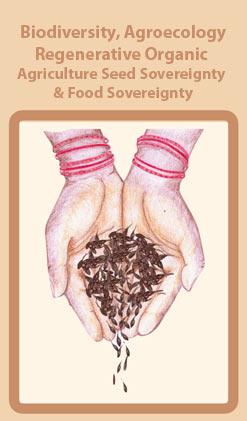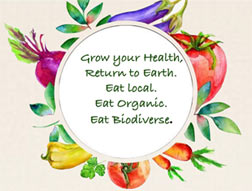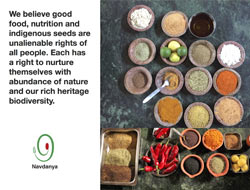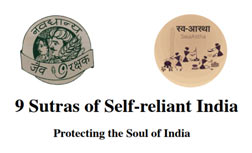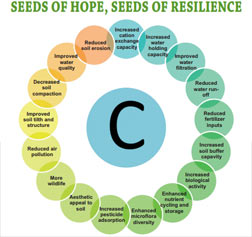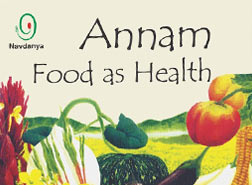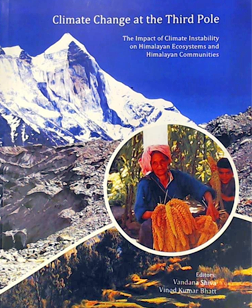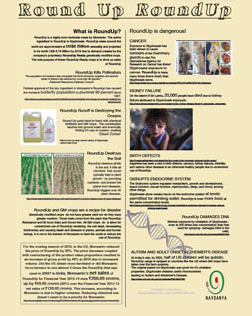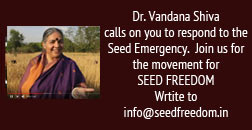Week 4th – Living Food

This week was focused on the living food system. Beginning with Dr. Mira Shiva, (a Medical Doctor, Public Health Expert, and Chairperson of Health Action International Asia -Pacific Founder) introduced the basics of nutrition and health, followed by another session on food misconceptions and how our diets should be rooted to place and our ancestors. Each region and place has built their food habits over generations, resulting in healthy and local food. Dr. Shiva discussed with the participants the poisons present in our food in the form of pesticides and fertilizers.’ More doctors are already prescribing GM-free diets. Doctors are strongly recommending patients eat strictly non-genetically modified foods. The soy is genetically engineered; due to this it is dangerous that we should never to eat it.’ Certified nutrition and wellness expert, Mr. Dinesh Kandwal, explained to the group that how we can stay healthy even when we are busy. ‘Foods which are low in nutritional value and have too many calories can pose serious health problems, including weight gain, cardiovascular problems and diabetes. It is important to stick to a healthy diet and a strict routine’ He said. Dr. D.S Rawat and Pramod Kimothi also had course. During this participant share the wild food and wild food forgotten foods from their regions. The practical session of week was based on cooking with forgotten foods, especially millets. Participants prepared mandate ka Halwa and mints and till mix chutney. Mr. Madhav shared recipes for Vedic food and participants take the delicious vedik lunch.
Week 3

“Now the chemical industry has taken over the seed supply through genetic engineering and patents. Seed slavery is ethically important to address because it transforms the Earth family into corporate property. It is ecologically important because with seeds in the hands of five corporations, biodiversity disappears, and is replaced by monocultures of GMOs (genetically modified organisms). It is socially important because without seed sovereignty, there is no food sovereignty”.
- Dr. Vandana Shiva
Improve the Food Security by cultivating diversity; cultivating the biodiversity is the only solution to reverse the trend of extinction. And there is a possibility of feeding the world and sustaining the planet.... Participatory plant breeding helps keeping conservation of biodiversity. It is now recognized that the shortcomings of centralized plant breeding are related to their inability to address the enormous diversity of environmental conditions and end-users’ needs.
- Dr. Salvatore Ceccarelli
This week of the A-Z course highlighted the soul of agriculture, the living seed and biodiversity, difference between traditional open pollinated seeds, Green Revolution varieties – hybrids and GMOs; why save seeds, participatory and evolutionary breeding, seed conservation, creating community seed banks and seed libraries; Pest and Post Harvest Management and the work we do here at Navdanya. We began with an introduction to seed saving, selection and conservation by our own Dr. Vinod Bhatt, Navdanya’s executive director. Dr. Vandana Shiva brought to light the political dimension of the seed and the global movements for seed freedom, chemical cartel and current issues related to seed, inviting each and every one of us to join the movement and take it home with us.
This was followed by two days explanation and instruction on breeding by Dr. Salvatore Ceccarelli, an expert in participatory plant breeding and evolutionary plant breeding. Dr. Ceccarelli took us out into the fields and explained how farmers are able to breed their crops to suit their agroecological regions, therefore producing more resilient and climate adapted varieties. Participants learned that farmers have been active agents in the process of seed selection and production and that this has, with the process of time, become an external practice and thereby separated the farmer from this process. Dr. Ceccarelli has successfully been working in different parts of the world to include local farmers in the process of variety production.
Mr. Darwan Singh Negi, explained to the group how irrigation is place and soil specific, like many other aspects of agroecological farming, the systems we use on our farm are not applicable in more arid areas. He shared some simple techniques to conserve and increase water levels. Mr. Negi also explained to the group how to preapare the compost and vermi compost at own farm. The daily practicals brought us closer to seed through seed selection from the fields, seed sorting at our seed bank and a special session where we exchanged seeds with local women from seed banks nearby. In addition to this we took participants to a nearby community seed bank (Shinghniwala and Bhoodpur village) allowing for a dialogue between course participants and these women who are actively saving local seeds.
Week 2

Dehradun. September 7 to13th , 2015. Navdanya Biodiversity farm is organizing ‘A-2-Z’ Program on Organic Farming and Argo-biodiversity, since 1st September. These seven days of this Month were devoted for Living Soil. In this week participants were involved to learn about Soil Food Web, Renewal of Soil Fertility; Composing and other method of rejuvenating and improving soil health. The practical training was also conducted during this Week on Knowing Soil structure, Soil under Microscope, Compost building, Jeevamrit, Ghanamrit, Panchagavya.
Faculties for the week: Dr.Av Singh, , Dr. Hari Raj Singh , Dr. Vinod Kumar Bhatt, Dr. R.S Rawat, Mr. Chris Kennedy & Ms. Marilyn McHhugh , Mr. D.S. Negi and the Navdanya team.
Week 1

Dehradun. September 1, 2015: Navdanya is organizing one month ‘A to Z’ Program on Organic Farming and Agro-biodiversity since 1st September, 2015. The inaugural session of the programme was organized in conference hall of Navdanya farm at Ramgarh, Dehradun. The session was presided over by Dr, Vandana Shiva, founder director of the trust. On this occasion WG. Cdr Kuldip Shiva,. Executive director, Dr. Vinod Kumar Bhatt and Dr. Av Singh also shared the dais. More than a dozen specialists and 56 participants from all over of the world are joining this program.
Faculties for this one month programme is Dr. Vandana Shiva, Dr. Salvatore Ceccarelli, Dr. Mira Shiva, Dr. Sultan Ismail,Fmr Andre Leu, President of IFOAM, Ronnie Cummins, Directors & Co-founder Organic Consumer Alliance (OCA ), Will Allen, Dr. JC Tarafdar, Dr. Vir Singh, Dr. V.P. Uniyal / Preeti Virkat, Dr. Vinod Kumar Bhatt, Dr. Av Singh, Mr. Hari Raj Singh, Ms. Marilyn McHugh, Mr. Chris Kennedy, R.S. Rawat, D.S. Negi, Bija Devi and the Navdanya team.


